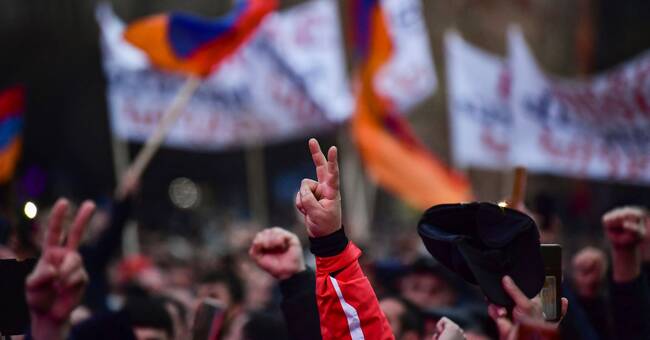In April 2018, Nikol Pasjinian, a former journalist and political prisoner, led protests in Yerevan that ended with him peacefully taking power from the then Russia-backed government.
The "Velvet Revolution" is considered a milestone in Armenia's history.
A major step in a democratic direction and away from decades of oligarchy with widespread corruption.
But now the slogans of the masses are directed at Nikol Pasjinian himself.
"Nikol, traitor" shouts the choir while the Armenian military demands his resignation.
A demand that Pasjinian called a coup attempt.
The anger against Pasjinian has been boiling since the six-week war against Azerbaijan last year, which ended in a catastrophic defeat for Armenia.
Thousands of soldiers and civilians lost their lives on both sides and about a hundred thousand Armenians were forced to flee their homes.
In the eyes of many Armenians, it was a betrayal of Nikol Pasjinian to sign the peace agreement in November 2020, which forced Armenia to hand over large tracts of land in the disputed Nagorno-Karabakh region.
Armenia's government crisis has escalated further as protesters stormed government buildings on Monday.
At the same time, Nikol Pasjinian has called out his supporters on the streets to show his support for the elected government.
With power struggles between government critics and supporters on the streets and military intrigue behind the scenes, Pasjinian's political future is, to say the least, uncertain.
But it is not just the country's leadership that is at stake.
The development is also a major setback for the newborn democracy movement of the Velvet Revolution, which hopes to turn Armenia on a path away from corruption and dependence on Moscow.
Many in Armenia conclude that the scorching loss of war was the price Armenia had to pay to try to become more democratic and independent from Russia.
An authoritarian government backed by Moscow appears safer in comparison.
Many Armenians are also deeply disappointed by the US and the EU's lack of support during the conflict.
At the same time, the defeat of the war has made Armenia even more dependent on Russia militarily.
The peace agreement was mediated by Russia and the peace in Nagorno-Karabakh is monitored by Russian forces.
It is said that the road to hell is lined with good intentions.
It is perhaps stomach-churning to say that the intentions of the velvet revolution are barking at hell.
But if Pasjinian is to survive politically at all, he will have to replace the soft velvet with harder material.
Whether or not Pasjinian stays, it looks bleak for the development of democracy in Armenia.

